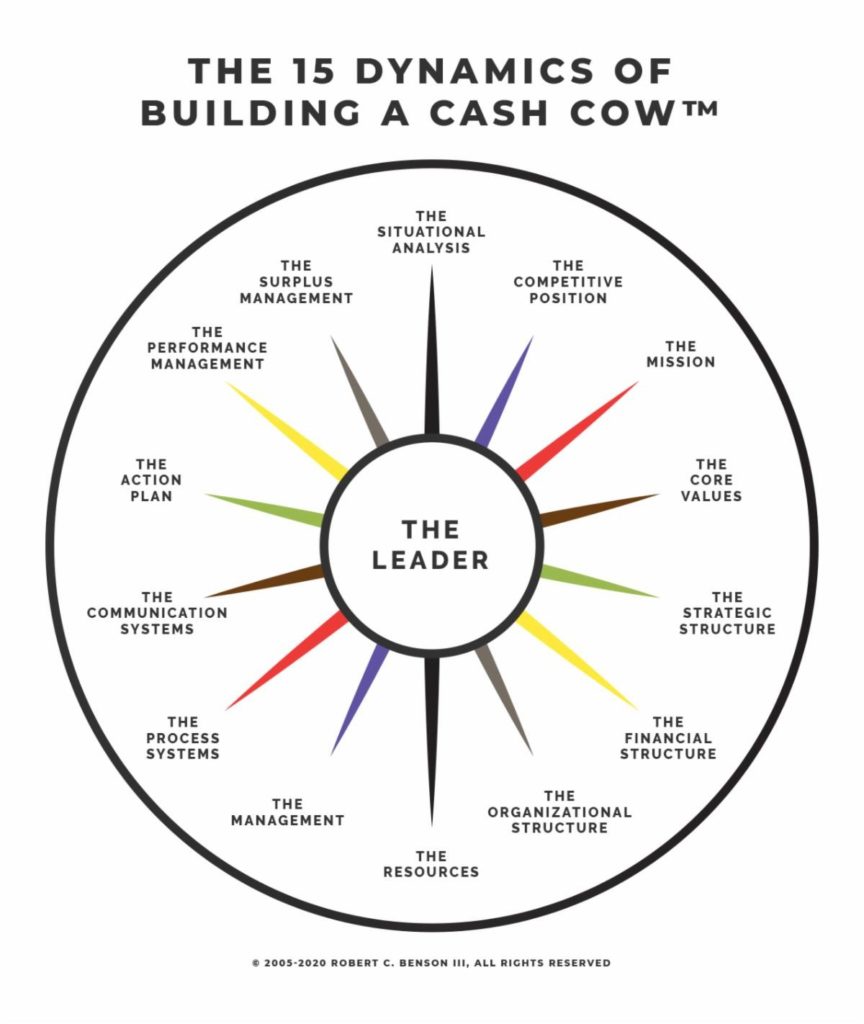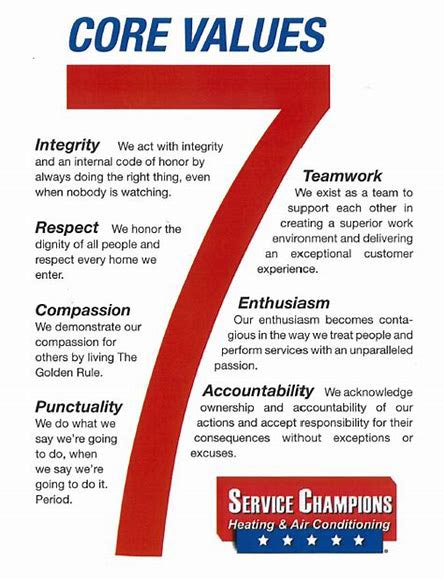The 15 Dynamics of Building a Cash Cow™ PART 5
THE CORE VALUES
I am writing a series of articles on The 15 Dynamics of Building a Cash Cow™. Most of the articles, including this one, are applicable to both profit and non-profit companies. In this article, we will look at how to perpetuate the core values you want to be established throughout the organization as it grows.
Recap
IN THE INTRODUCTION, I presented The Driving Principle that “all data is not equal.” Ralph Waldo Emerson noted that “The value of a principle is the number of things it will explain.” Why? Because it is transferable to many applications and realms of our life and business. Then I discussed an insight that is even more powerful: “The value of a Driving Principle is the number of things it will do for your company.” Applying them will transform the company.
IN PART 1, THE LEADERSHIP, I created the awareness of The Driving Principle: “The leader’s belief system determines the effectiveness of the leader and the company.” Faulty beliefs, of which there are many in the business world, like “formal business planning is a waste of time,” significantly limit your profits and growth.
IN PART 2, THE SITUATIONAL ANALYSIS, it was noted that a sound business plan begins with a situational analysis. The Driving Principle: “To know where you are going, you must first know where you are.” Therefore, we provided the readers with methodologies to perform a competitor analysis, a SWOT analysis, and an external forces analysis.
IN PART 3a & 4a, THE COMPETITIVE POSITION, you learned that there are three Core Competitive Strategies and only three! Then you learned there are 16 Grand Strategies. The Driving Principle of each of these is “Pick one and give total commitment to it!” Then we demonstrated how to use them to design a competitive position to take you to the next level.
IN PART 4, THE MISSION STATEMENT, you learned that an effective, clear, and inspirational mission statement is comprised of three components: the Vision, Diving Principle – “Without a vision, the people perish”; Mission, Driving Principle – “Without a goal, you can’t score”; and Purpose – Driving Principle, “People do things for their reasons, not yours.”

What the leader believes to be reality is reflected and integrated in the company through his/her behavior and decisions. I know it is intimidating, but Consider how the beliefs of a U. S. President affect our country, and what a governor has on you and the state you live in. Think about the impact leaders of the companies you have worked for had or have on the companies. And the impact your parents had/have on you and your family? My objective is to empower you with sound Driving Principles.
Driving Principles have the power to drive the culture, growth, profits, cash flow, and overall success of your company to the next level and beyond to the top 25% of your industry. Even if you are profitable and growing, if your company’s financial performance is not in the top 25%, it is underperforming. On average, the top 25% of companies make about twice as much profit as the middle 50% and about three times as much profit as the average company. I hope you enjoy putting these Driving Principles to work in your company.
Case Study
Remember Small Engineering Company (SEC). As a part of their strategic business plan, we helped them develop a strategic business plan to increase their market share. As a key part of the plan, SEC went through the process below. Their reputation for actually living by their exceptional values spread. This enabled them to become the engineering firm of choice for one of the largest hospital systems on the East coast and a general contractor that was building several hospitals. Their key clients were instrumental in the very successful sale of the owner’s profitable and growing small firm, enabling him to retire.
“Unless a commitment is made, there is only promise and hopes; but no plans.”
Peter Drucker
Defining Your Core Values
The benefit of core values is they perpetuate the core values you want to be established throughout the organization as it grows. I recommend you hold a meeting with your leadership team and get its input when defining your core values. To help you get started, the following is a list of values. Rate each value’s importance to the company, from your perspective. For each value, check the box that indicates how important you think it is to the company with 1 being not very important and 5 being very important. Choose the ten you feel are the most important to the company and place them on the right side.

“By failing to prepare, you are preparing to fail.”
Benjamin Franklin
Selecting Your Core Values
Select your top ten values from the exercise by prioritizing them from 1 to 10, 1 being the most important to the perpetual success of the company. Then select your top five to seven values and list them on the right side. Try not to select more than seven so that everyone can learn them and use them in their behavior and making decisions on a daily basis.

“You have laid down precepts that are to be fully obeyed, Oh that my ways were steadfast in obeying your decrees!”
Psalm 119:4-5
Describing Your Core Values
To clarify their meanings, write a description of each one as the company below did. Publish them in your employee handbook and frame and hang them up throughout the company. Have your department managers meet with their personnel to review and discuss them. Let everyone know how the core values may affect their performance evaluations in the future. Sound values that everyone understands will amaze you on how much easier it will be to lead and manage your corporate culture to the desired outcomes. The driving principle? What you feed, grows!

SMALL ENGINEERING COMPANY
“What you feed, grows!”
CORE VALUES
Following are the core values established by SEC that created the corporate culture used to drive their hiring and companywide decision making. As mentioned, these values were a key to their growth and ability to obtain one of the largest hospital systems on the east coast as a client.
Balance…We encourage and support harmony between work and family both as a company and as individuals.
Integrity…We conduct ourselves and our business with ethics and a strong moral code; including honesty, trust, and genuine respect for others and our environment.
Service…We strive to provide mechanical and electrical engineering design that is to the best of our ability, with emphasis on responsive service and supporting quality care.
Excellence…Each team member strives to perform at high levels to help the hospitals and healthcare facilities that we engineer to provide their patients with safe and secure care.
Relationships…We maintain high-quality relationships by demonstrating loyalty, commitment, responsibility, and mutual respect for one another and our clients.
YOUR VISION AND THE DRIVING PRINCIPLES
I encourage you to follow along with me as we examine the Driving Principles and beliefs fueling The 15 Dynamics of Building a Cash Cow™. When we are done you will have a valuable blueprint to build your business and accomplish your vision and goals.
Next, in PART 6, we will explain and give you insights into The Strategic Structure of a business. We have seen how these insights will forever change how leaders view their business and develop their business plans.
The Lord be with you and keep you safe!

If you have feedback or questions for Bob, email him at bob@CCBAlliance.org. For more information on The Colorado Christian Business Alliance go to CCBAlliance.org. If someone you know would like to receive these BobChats™ email the information to clancaster@abadvisors.com.
Robert C. Benson III (Bob) is the co-founder and past President/CEO of American Business Advisors, Inc., a Business strategic, finance, and management advisory firm specializing exclusively in the unique opportunities and issues faced by small and mid-sized companies. He successfully founded or co-founded seven businesses, including being a co-founder and former President of SecurCare Self Storage, Inc., now National Storage Affiliates (NSA), a public company and the 4th largest self-storage company in America. Bob is also the founder and former Managing Partner of the CPA firm, Benson Wells & Co, now Corne Jantz and Associates. Mr. Benson’s credentials include being a CPA*, Certified Management Consultant, and Chartered Global Management Accountant. He is also the author of STAND FIRM WITH GOD’S POWER IN BUSINESS and numerous business and spiritual articles. Bob is married and has two sons and four grandchildren.

